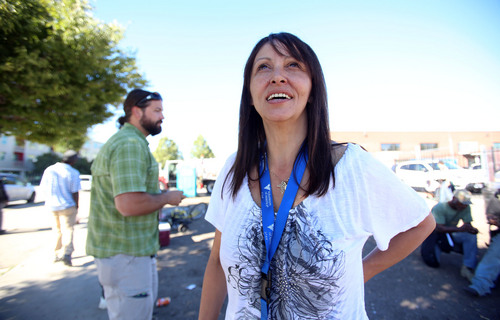This is an archived article that was published on sltrib.com in 2013, and information in the article may be outdated. It is provided only for personal research purposes and may not be reprinted.
Gina Salazar made it out.
The 45-year-old Salt Lake City woman said goodbye to homelessness, heroin addiction and prostitution.
"I really didn't realize there was another way to live," she says of breaking free in 2003 from the hopeless cycle she had lived since hitting the streets at 22.
Now she is a paid outreach worker for Volunteers of America, setting an example for people still trapped in the cycle.
"I can reach out and give compassion and understanding and that makes me very happy," she says. "I'd like people to see everybody is not a lost cause. It's possible to be enmeshed in all that and then get out and live a quality life."
Salazar's father and mother were substance abusers. Her father died of a heroin overdose when she was 16. She was sexually abused by her grandfather. Her mother later died of a heart attack that most likely was brought on by her methamphetamine addiction.
Salazar asks that people not judge addicts, prostitutes or the homeless,
"You don't know if that person had a bad upbringing," she says. "They are human beings. Sometimes bad things happen to good people."
Salazar recalls being arrested for prostitution many times. Eventually, with a drug charge, she was sentenced to zero to five years at the Utah State Prison. That is when she came into contact with Alcoholics Anonymous.
"I just grabbed on to something that was presented to me in prison," she says. "I kept going to meetings [after leaving prison] and eventually changed my life."
She is now married and happy and healthy.
"Without the people in my life who gave me a hand up, I wouldn't have made it," Salazar says, noting that with the right amount of help other drug-addicted women in the shadows of State Street can find a new day in the sun.
"If I have no hope for the hopeless, then I have no hope for myself."



